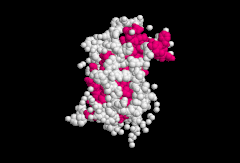
Back Groeihormoon AF هرمون النمو Arabic Соматотропин Bulgarian Hormon rasta BS Somatotropina Catalan Růstový hormon Czech Væksthormon Danish Somatropin German ގްރޯޘް ހޯރމޯން DV Αυξητική ορμόνη Greek
| Growth hormone 1 (pituitary) | |||||||
|---|---|---|---|---|---|---|---|
 Growth hormone | |||||||
| Identifiers | |||||||
| Symbol | GH1 | ||||||
| NCBI gene | 2688 | ||||||
| HGNC | 4261 | ||||||
| OMIM | 139250 | ||||||
| RefSeq | NM_022562 | ||||||
| UniProt | P01241 | ||||||
| Other data | |||||||
| Locus | Chr. 17 q22-q24 | ||||||
| |||||||
| Growth hormone 2 (placental) | |||||||
|---|---|---|---|---|---|---|---|
| Identifiers | |||||||
| Symbol | GH2 | ||||||
| NCBI gene | 2689 | ||||||
| HGNC | 4262 | ||||||
| OMIM | 139240 | ||||||
| RefSeq | NM_002059 | ||||||
| UniProt | P01242 | ||||||
| Other data | |||||||
| Locus | Chr. 17 q22-q24 | ||||||
| |||||||
Growth hormone (GH) or somatotropin, also known as human growth hormone (hGH or HGH) in its human form, is a peptide hormone that stimulates growth, cell reproduction, and cell regeneration in humans and other animals. It is thus important in human development. GH also stimulates production of insulin-like growth factor 1 (IGF-1) and increases the concentration of glucose and free fatty acids.[1][2] It is a type of mitogen which is specific only to the receptors on certain types of cells. GH is a 191-amino acid, single-chain polypeptide that is synthesized, stored and secreted by somatotropic cells within the lateral wings of the anterior pituitary gland.
A recombinant form of HGH called somatropin (INN) is used as a prescription drug to treat children's growth disorders and adult growth hormone deficiency. In the United States, it is only available legally from pharmacies by prescription from a licensed health care provider. In recent years in the United States, some health care providers are prescribing growth hormone in the elderly to increase vitality. While legal, the efficacy and safety of this use for HGH has not been tested in a clinical trial. Many of the functions of HGH remain unknown.[3]
In its role as an anabolic agent, HGH has been used by competitors in sports since at least 1982 and has been banned by the IOC and NCAA. Traditional urine analysis does not detect doping with HGH, so the ban was not enforced until the early 2000s, when blood tests that could distinguish between natural and artificial HGH were starting to be developed. Blood tests conducted by WADA at the 2004 Olympic Games in Athens, Greece, targeted primarily HGH.[3] Use of the drug for performance enhancement is not currently approved by the FDA.
GH has been studied for use in raising livestock more efficiently in industrial agriculture and several efforts have been made to obtain governmental approval to use GH in livestock production. These uses have been controversial. In the United States, the only FDA-approved use of GH for livestock is the use of a cow-specific form of GH called bovine somatotropin for increasing milk production in dairy cows. Retailers are permitted to label containers of milk as produced with or without bovine somatotropin.
- ^ Ranabir S, Reetu K (January 2011). "Stress and hormones". Indian Journal of Endocrinology and Metabolism. 15 (1): 18–22. doi:10.4103/2230-8210.77573. PMC 3079864. PMID 21584161.
- ^ Greenwood FC, Landon J (April 1966). "Growth hormone secretion in response to stress in man". Nature. 210 (5035): 540–1. Bibcode:1966Natur.210..540G. doi:10.1038/210540a0. PMID 5960526. S2CID 1829264.
- ^ a b Powers M (2005). "Performance-Enhancing Drugs". In Leaver-Dunn D, Houglum J, Harrelson GL (eds.). Principles of Pharmacology for Athletic Trainers. Slack Incorporated. pp. 331–332. ISBN 978-1-55642-594-3.